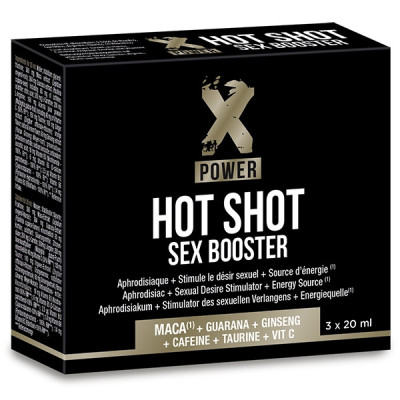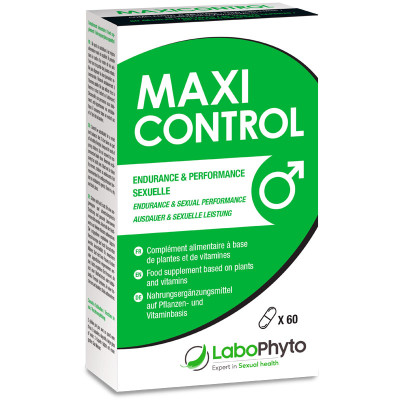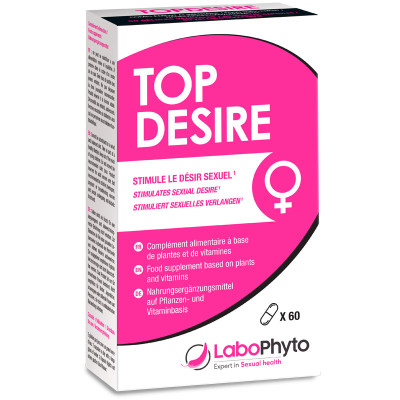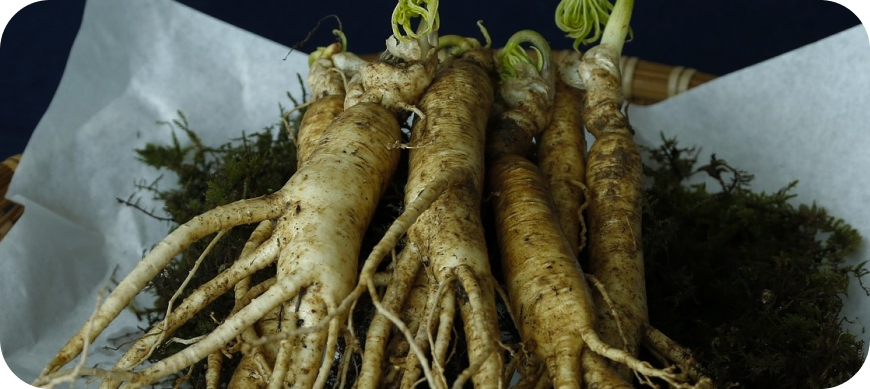
All about Ginseng
Reading time: 25 minutes
Ginseng has been used in traditional Chinese medicine for centuries. This short, slow growing plant with fleshy roots can be classified in three ways, depending on how long it has been grown: fresh, white or red.
Fresh ginseng is harvested before 4 years, while white ginseng is harvested between 4 and 6 years and red ginseng is harvested after 6 years or more. There are many types of this plant, but the most popular are American ginseng (Panax quinquefolius) and Asian ginseng (Panax ginseng).
American and Asian ginsengs are distinguished by their concentration of active compounds and their effects on the body. American ginseng is believed to act as a relaxant, while the Asian variety has an invigorating effect.
Ginseng contains two important compounds: ginsenosides and gintonin. These compounds complement each other to provide health benefits.
What is ginseng?
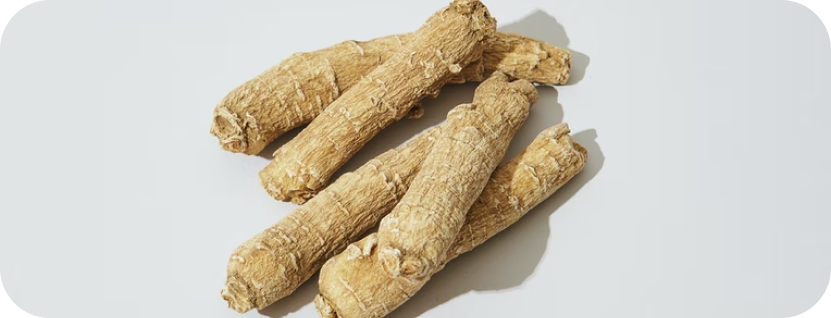
In traditional Chinese medicine, ginseng is recognized and used for its properties on physical and mental well-being but also as a sexual tonic for men and women. The ginsenosides contained in ginseng are responsible for these effects.
Indeed, according to some authors, these compounds act as an active ingredient on well-being. Ginseng also has virtues for erectile function. Indeed, it stimulates the production of Nitric Oxide (NO), by acting on the central nervous system and the gonadal tissues. By releasing NO, it increases vasodilation and thus facilitates erection.
According to an American study, published on July 15, 2015 in the journal SEXUAL MEDICINE REVIEW, Ginseng is the natural aphrodisiac plant par excellence that improves erectile dysfunction in men. Ginseng also has properties for women's sexuality, in fact, it helps to improve women's arousal, especially at the time of menopause.
What are the benefits of ginseng?

Reduces inflammation
Ginseng has beneficial antioxidant and anti-inflammatory properties. Some test-tube studies have shown that ginseng extracts and ginsenoside compounds can inhibit inflammation and increase the antioxidant capacity of cells.
For example, a test-tube study found that Korean red ginseng extract reduced inflammation and improved antioxidant activity in skin cells of people with eczema.
The results are also promising in humans. One study looked at the effects of 18 young male athletes taking 2 grams of Korean red ginseng extract three times a day for seven days. The men then had levels of certain inflammatory markers tested after performing an exercise test. These levels were significantly lower than in the placebo group, up to 72 hours after the test. However, it should be noted that the placebo group received a different herbal remedy, so these results should be taken with a grain of salt and further studies are needed.
Finally, a larger study followed 71 postmenopausal women who took 3 grams of red ginseng or a placebo daily for 12 weeks. Antioxidant activity and oxidative stress markers were then measured. The researchers concluded that red ginseng may help reduce oxidative stress by increasing the activity of antioxidant enzymes.
Beneficial for brain function
Ginseng may help improve brain functions like memory, behavior and mood. Some test-tube and animal studies show that components of ginseng, like ginsenosides and Compound K, may protect the brain against free radical damage. One study followed 30 healthy people who consumed 200 mg of Panax ginseng daily for four weeks. At the end of the study, they showed improvement in their mental health, social functioning and mood. However, these benefits ceased to be significant after 8 weeks, suggesting that the effects of ginseng may diminish with prolonged use.
Another study looked at how single doses of 200 or 400 mg of Panax ginseng affected mental performance, mental fatigue, and blood sugar levels in 30 healthy adults before and after a 10-minute mental test. The 200 mg dose, as opposed to the 400 mg dose, was more effective in improving mental performance and fatigue during the test. It's possible that ginseng helped cells uptake blood sugar, which could have improved performance and reduced mental fatigue. However, it is not known why the lower dose was more effective than the higher one.
A third study found that taking 400 mg of Panax ginseng daily for eight days improved calmness and math skills. Additionally, other studies have found positive effects on brain function and behavior in people with Alzheimer's disease.
Improves erectile dysfunction
Research has shown that ginseng may be a useful alternative for the treatment of erectile dysfunction (ED) in men. It appears that the compounds it contains may protect against oxidative stress in the blood vessels and tissues of the penis and help restore normal function. Additionally, studies have shown that ginseng may promote the production of nitric oxide, a compound that improves muscle relaxation in the penis and increases blood circulation.
One study found that men treated with Korean red ginseng had a 60% improvement in erectile dysfunction symptoms, compared to 30% for a drug used to treat erectile dysfunction.
Additionally, another study showed that 86 men with erectile dysfunction experienced significant improvement in erectile function and overall satisfaction after taking 1000mg of aged ginseng extract for 8 weeks. However, more studies are needed to draw firm conclusions about the effects of ginseng on erectile dysfunction.
Boosts the immune system
Ginseng can strengthen the immune system. Some studies exploring its effects on the immune system have focused on cancer patients undergoing surgery or chemotherapy treatment.
One study followed 39 people recovering from surgery for stomach cancer, treating them with 5,400 mg of ginseng daily for two years. Interestingly, these individuals showed significant improvements in immune function and less recurrence of symptoms.
Another study looked at the effect of a red ginseng extract on immune system markers in people with advanced stomach cancer undergoing post-surgical chemotherapy. After three months, people taking red ginseng extract had better immune system markers than those in the control or placebo group.
Additionally, one study suggested that people who take ginseng may have up to a 35% better chance of living disease-free for five years after curative surgery and up to a 38% better chance of survival than to those who do not take it.
It seems that ginseng extract could also enhance the effect of vaccines against diseases like influenza. Even though these studies show an improvement in immune system markers in people with cancer, more research is needed to demonstrate the effectiveness of ginseng in boosting resistance to infection in healthy people.
Has potential benefits against cancer
Ginseng may be helpful in reducing the risk of certain cancers. The ginsenosides in this herb have been shown to help reduce inflammation and provide antioxidant protection. The cell cycle is the process by which cells normally grow and divide. Ginsenosides may benefit this cycle by preventing abnormal cell production and growth.
A review of several studies concluded that people who take ginseng may have a 16% lower risk of developing cancer.
Additionally, an observational study suggested that people taking ginseng may be less likely to develop certain types of cancer, such as cancer of the lips, mouth, esophagus, stomach, colon. , liver and lung, than those who do not take it.
Ginseng can also help improve the health of patients undergoing chemotherapy, reduce side effects and enhance the effect of certain treatment drugs. Although studies on the role of ginseng in cancer prevention show some benefits, they are not conclusive.
Fights fatigue and increases energy level
Ginseng has been shown to help fight fatigue and promote energy. Various animal studies have linked certain components of ginseng, such as polysaccharides and oligopeptides, to decreased oxidative stress and increased energy production in cells, which may help combat fatigue.
A four-week study explored the effects of giving 1 or 2 grams of Panax ginseng or a placebo to 90 people with chronic fatigue. Those who received Panax ginseng experienced less physical and mental fatigue, as well as a reduction in oxidative stress, than those who took the placebo.
Another study gave 364 cancer survivors with fatigue 2,000 mg of American ginseng or a placebo. After eight weeks, people in the ginseng group had significantly lower levels of fatigue than those in the placebo group.
Additionally, a review of over 155 studies suggested that ginseng supplements may not only help reduce fatigue, but also improve physical activity.
Reduces blood sugar
Ginseng appears to benefit blood sugar control in people with and without diabetes. American and Asian ginseng have been shown to improve pancreatic cell function, stimulate insulin production, and improve blood sugar uptake into tissues. Additionally, studies show that ginseng extracts help by providing antioxidant protection that reduces free radicals in the cells of people with diabetes.
One study evaluated the effects of 6 grams of Korean red ginseng, in addition to regular diabetes medications or diet, in 19 people with type 2 diabetes. Interestingly, these people were able to maintain good blood sugar control while over the 12 weeks of the study. They also recorded an 11% drop in blood sugar, a 38% decrease in fasting insulin, and a 33% increase in insulin sensitivity.
Another study showed that American ginseng helped improve blood sugar levels in 10 healthy people after they took a sugary drink test. It looks like fermented red ginseng might be even better at controlling blood sugar. Fermented ginseng is produced using live bacteria that transform ginsenosides into a more easily absorbed and more potent form.
In fact, one study showed that taking 2.7 grams of fermented red ginseng daily was effective in lowering blood sugar and increasing insulin levels after a test meal, compared to a placebo.
What are the side effects of ginseng?
According to research, ginseng appears to be safe and should not produce serious adverse effects. However, people taking diabetes medication should closely monitor their blood sugar levels when using ginseng to ensure that the level does not drop too low.
Additionally, ginseng may reduce the effectiveness of blood-thinning medications. For these reasons, talk to your doctor before supplementing with ginseng.
Note that due to lack of safety studies, ginseng is not recommended for children or pregnant or breastfeeding women. Finally, some data suggests that prolonged use of ginseng may decrease its effectiveness in the body. To maximize its benefits, it is advisable to take ginseng in cycles of 2 to 3 weeks, interspersed with a break of one or two weeks.
How to consume ginseng?
We recommend that you take a suitable ginseng cure, alone or in a complex to intensify the effects and allow you to find a rich and fulfilling sex life! In addition, some stimulants contain ginseng for even more pleasure.



%201.png)
%201.png)
